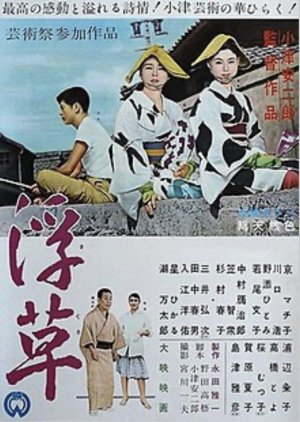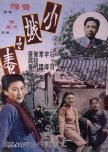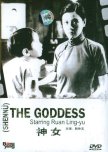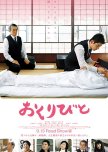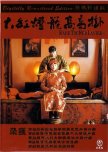
This review may contain spoilers
"Life is an unknown course"
Like the languid lapping of the waves against the shore near the quiet fishing village in this film, Director Ozu brings a gentle rhythm to the past meeting the present and directing the future currents for the people involved. Komajura and his troupe of traveling actors will find their lives changed as they navigate their circumstances and decisions in this remote place.Komajura is an aging actor with a less than successful acting troupe. He readily admits their Kabuki plays are not very good. Most of the players have only known the stage for most of their lives. In the sweltering heat of the day, they form a small parade in their costumes as they enter the village, handing out fliers. Some of the men seek out the prettiest women in town to invite to the play. Komajura seeks out an older woman and her 19-year-old son, Kiyoshi. Kiyoshi is actually Komajura's son, but only knows him as an uncle for Komajura doesn't want his son to have a poor actor for a father. Komajura's current mistress, Sumiko, becomes enraged when she finds out about his devotion to his secret family and hires one of the girls in the troupe, Kayo, to seduce the dutiful Kiyoshi setting into motion a wave of changes.
Though Floating Weeds has a romance with the young lovers, the main focus of the story is Komajura as the tides in his life change. He faces the loss of his troupe, his lover, and his son. He lashes out in fury in some of the most violent scenes I've seen in an Ozu film. He is forced to deal with his lack of control over his life circumstances and other people. Eventually, he comes to accept where he is in his life and what his relationships have come to be and that his loved ones will make their own decisions about their lives which he may not agree with. Many of the characters must decide who and where they want to be.
There are two scenes where Komajura becomes violent with the women who crossed him and his son. Though this male dominance may have been acceptable in 1959, it is jolting in this present time and incredibly offensive, making Komajura less sympathetic as he seeks to control the people around him through force. As with all Ozu films, the acting is normally quite restrained, making these outbursts all the more difficult to absorb.
The film itself is a beautifully staged and shot film. Ozu's scenic frames tell a story in and of themselves. They are contemplative, quiet, familiar, giving the characters and the audience room to think and breathe. Many of his frames would make incredible still lifes. His red tea kettle makes an appearance in the barber shop! In a powerful scene, Komajura and Sumiko have it out during a rainstorm. Each stands on the opposite side of the street, unwilling to budge, unwilling to move closer or get wet, unwilling to see the problem from the other's point of view. The words are vicious as the water pours down. Later, in a subtle bit of acting near the end in a train station, the same two actors drop their walls ever so slightly to let the other in as cigarettes are lit and forgiveness is given.
This film is a remake of his silent film, The Story in the Floating Weeds which I have yet to see as the film has no English subtitles. Floating weeds refers to itinerant actors. There were few weeds in this film, if I have any complaints, the movie did begin to feel long as some of the problems were dragged out and it felt as if some scenes could have been trimmed. Most of the acting was absorbing with the exception of the actor who played Kiyoshi. This young actor gave a rather wooden performance.
Ozu was a master of making family concerns and life decisions go from simple to complex to simply masterful. Though this film was not completely centered in a home, Komajura's family both biological and extended family with the troupe was explored. Ozu never ventures far from home and hearth, simply showing us different views of it. There is something comforting in his movies, we come to know the people and their struggles, their strengths and weaknesses, sometimes even see ourselves in them as they try to make the best of their lives. Komajura tells his old lover, "Life is an unknown course." The longer we live, the more these words resonate.
2/7/23
Edit—I have since watched and reviewed the original silent film.
Was this review helpful to you?

One of Ozu's best films; escape to a lazy seaside town
Floating Weeds (1959) showcases Ozu at his peak. This is a top notch film. While it might make sense to watch several other Ozu films beforehand, or even 'A Story of Floating Weeds' (from which Floating Weeds was remade), this film is also great as a first entry into Ozu's film world. Despite its PG rating, it's not an ideal film for young children.The film plot is more versatile than usual Ozu fare, with more sub-plots, and greater role character involvement. This is still a family drama, but the film's setting in a seaside town (somewhere near Seto Inland Sea) is a departure from the urban environs of many Ozu films, which take place in cities like Tokyo. And, rather than a family under a roof, we have a 'traveling family' here in the form of an acting troupe. The troupe members, like ronin - the wandering samurai of the Shogun-era, are never more than half-anchored to a place. At times, they seem desperate to put down roots but are so easily blown away by their own troubles, insecurities, or economic woes.
For those that enjoy romance, that part of this film is sufficient and enjoyable.
The sets were terrific. Ah, how much I desire to travel to a classic town where this film was made! The dark wood buildings containing eateries, post stores, and barber shops, blend seamlessly with residential space; a customer may be eating noodles at the home entrance room, and the room behind that is the cook's personal living room. This is not a town of commerce, but a place of quiet living, capturing what commerce enters their lazy cove. Business matters are lax. Having visited seaside towns before, there is something quaint, remote, and even nostalgic about these places. They are hiding from society.
The presentation of social life in this seaside town is antithetical to many Ozu settings where the industrial rush is in full display. The economic reality of such a place is not sugar coated either, but the film's place and people feel authentic, carefree, and even romantic. It's the place of quietude we've visited before that we yearn for in our busy lives, or simply never visited but instinctively know we would enjoy such a relaxing pace. In fact, the film's lack of emphasis on city, commerce, and post-war themes, as well as societal changes of the times, made this film feel like a timeless exploration of being human. It was, compared to other Ozu films with a clearer link to societal themes, refreshing to watch "Floating Weeds" without a societal themes commentary/agenda. It had a bit of an escapist feel to it, even for the veteran Ozu viewer.
Part of the humor in this film is that the troupe is not very good. But they're compelled to act together, drink together, and travel together. There's something about this group of semi-outcasts that is endearing. They are imperfect people, willing to backstab one another and then make up a week later, despite not being blood related. They don't feel like co-workers at all.
Machiko Kyo, as Sumiko, was captivating, complex, and convincing. She was, without a doubt, the star of the show despite having the 2nd most prominent role. Her earnestness and desperation is so restrained you can barely tell it is there as she masks it with jealousy, scheming, and cruel words. But we feel the slightest brush of her deepest emotion against our skin; despite a lifestyle of traveling with the wind, Sumiko craves a rooted relationship and won't give that up easily. There is a scene of reconciliation in this film that is simply masterful.
Ozu's style seems to have matured, even peaked in 'Floating Weeds'. I found the storytelling approach to be straightforward with fewer ellipses/gaps. Here, Ozu 'shows' us more of what we are thinking rather than implying action. Personally, I prefer a visual accompaniment as it is something to savor and sensually experience, rather than intellectualize alone in implied action scenes. I'm glad Ozu leaned on this more conventional approach in Floating Weeds.
A terrific film.
Was this review helpful to you?

This review may contain spoilers
a 'letterboxd' user reccomend me this film as a Top '1001 movies' all the time. So i give it a try. My first impression is, for 1959 movies the cinematography are okay. Not boring at all, I very enjoyed watch this film. What makes me disappointed is the love story between Kayo and Kiyoshi just too short, the ending of this two lovebirds for me like hanging, whereas I really enjoyed their love story. And the acting of some actor i think it's a bit weird, I don't know what the acting measurements of the past were like. But that's okay Was this review helpful to you?

This review may contain spoilers
It's complicated...
Finally, I can feel the warmth that was lost when I watched Equinox Flower and Early Spring here, even though as the film progressed the warmth also disappeared.The film opens with a windy opening that is soothing but still hot. The location is also a lot of feast for the eyes and I like that.
What triggers the conflict in this film is the friction between past and present relationships; It was only natural for Kamajuro to frequently visit his mistress, Oyoshi to see his now-adult son, Kiyoshi, who he had not seen for a long time. However, because of that his current partner, Sumiko who is also part of the theater led by Kamajuro, starts to get suspicious and when he finds out why Kamajuro always goes out of the natural theater, Sumiko is jealous, and the moment when Sumiko comes to Oyoshi's place becomes the moment where friction occurs and the fire starts. The fire that was already burning earlier began to simmer many emotional moments in this film.
In addition to the conflict between Kamajuro and Sumiko that got hotter, and for the first time during my time watching Ozu's films, I could see the romance in Ozu's film, shown in the relationship between Kiyoshi and Kayo, although it started out badly, but they looked cute when the two of them, but the relationship had an effect on Kiyoshi, who became blinded by a love that has a message to young people that is to forget about love for a moment, it's better to pursue your dream, make a lot of money from that job, then raise the life of your parents and your soul mate will definitely not going anywhere. That message is still relevant today.
I also like the acting of the cast which is really good in my opinion. Especially Ganjiro Nakamura and Machiko Kyo, they can put emotions into the bickering scene where they are placed in 2 opposite places and the rains act like a barrier and that was really really cool.
Overall, the film is satisfying, so far there has been no Ozu film that I put into the bad category, hopefully it's all good.
Was this review helpful to you?

